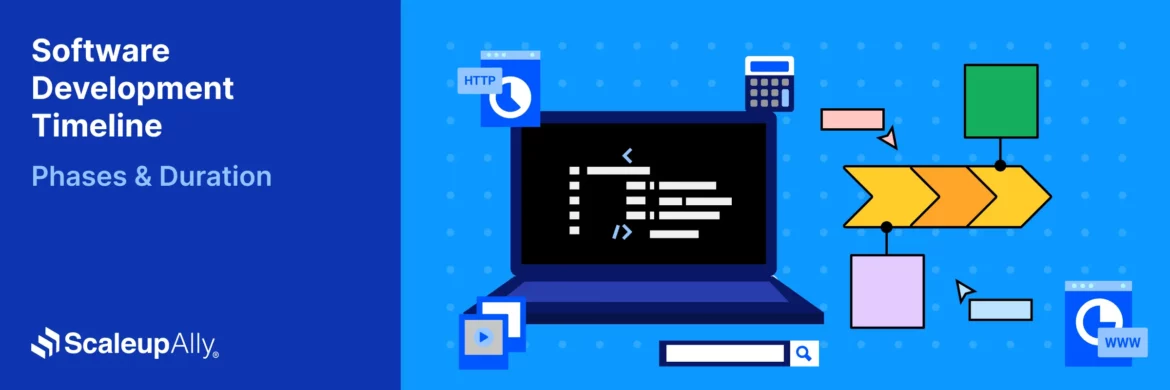
How Long Does It Take to Build a Healthcare Website?
Suprabhat Sen | December 28, 2023 , 8 min read
Table Of Content
Building a healthcare website is an essential step for healthcare professionals, clinics, hospitals, and other organizations looking to enhance their online presence and improve patient care. However, one common question that arises is, “How long does it take to build a healthcare website?”
In this article, we will dive into the factors that can affect the development time of healthcare websites and provide insights into the timeframes for building different types of healthcare websites.
Key Takeaways
- The time to build a healthcare website varies widely based on project complexity, ranging from a few weeks to over a year.
- Key factors affecting development time include design, features, content, compliance, and team expertise.
- Simple websites take 2–4 weeks, while advanced systems like EHRs can take 6–12+ months.
- Regulatory requirements like HIPAA can significantly extend development timelines.
- Clear planning, agile methods, and prioritizing essential features can speed up the development process.
Factors Affecting Development Time of Healthcare Websites
Several factors can influence the time required to build a healthcare website. Understanding these factors is crucial for healthcare organizations to plan and manage their web development projects effectively. Here are some key factors to consider:
- Project Scope: The complexity and scale of the website project play a significant role in determining the development time. Websites with basic functionalities, such as informational websites or appointment scheduling portals, may require less time compared to complex web applications with advanced features like telemedicine integration or electronic health record (EHR) systems.
- Design and User Experience: The design and user experience (UX) of a healthcare website are critical for engaging users and ensuring a seamless experience. Developing a visually appealing and user-friendly website may require additional time for wireframing, prototyping, and design iterations.
- Functionality and Features: The specific functionalities and features required for a healthcare website can impact the development time. Websites that need integrations with external systems, such as EHRs or payment gateways, may require additional time for API development and testing.
- Content Creation: The amount and complexity of content creation can affect the overall development time. Healthcare websites often require compelling and accurate content, including medical information, blog articles, and patient resources. Developing and reviewing content can add to the project timeline.
- Regulatory Compliance: Healthcare websites must adhere to strict regulatory requirements, such as the Health Insurance Portability and Accountability Act (HIPAA) in the United States. Ensuring compliance with these regulations may involve additional time for implementing necessary security measures and privacy protocols.
- Team Size and Expertise: The size and expertise of the development team can influence the development time. A larger team with diverse skills and experience may be able to complete the project more efficiently compared to a smaller team with limited resources.
- Testing and Quality Assurance: Thorough testing and quality assurance are essential to ensure the functionality, security, and usability of a healthcare website. Allocating sufficient time for testing and bug fixes is crucial to deliver a high-quality website.
How Long Does It Take to Build a Healthcare Website?
The time required to build a healthcare website can vary depending on the complexity and specific requirements of the project. Here, we will provide a general overview of the timeframes for building different types of healthcare websites:
- Simple Healthcare Website: A simple healthcare website with basic functionalities, such as information about the healthcare organization, services provided, and contact information, can typically be developed within 2-4 weeks. This timeframe includes design, development, content creation, and testing.
- Appointment Scheduling Portal: Building a healthcare website with appointment scheduling capabilities may take approximately 4-8 weeks. This timeframe includes integrating appointment scheduling software, developing user-friendly interfaces, and testing the functionality.
- Telemedicine Platform: Developing a telemedicine platform that enables remote consultations between healthcare providers and patients can take around 8-12 weeks. This timeframe includes building video conferencing capabilities, implementing secure messaging features, and ensuring HIPAA compliance.
- Electronic Health Record (EHR) System: Building a comprehensive EHR system can be a complex and time-consuming process. The development of an EHR system may take anywhere from 6 months to 1 year or more, depending on the scope and requirements of the project. This timeframe includes designing and implementing robust data management systems, integrating with external healthcare systems, and ensuring data security and privacy.
It’s important to note that these timeframes are approximate and can vary based on the specific requirements, team size, expertise, and project management approach. Collaboration and effective communication between the development team and the healthcare organization are essential to ensure timely delivery.
Tips for Speeding Up Healthcare Website Development Process
While the development time of a healthcare website can vary, there are several strategies to speed up the process and ensure efficient project management. Here are some tips to consider:
- Define Clear Goals and Requirements: Clearly define the goals, functionalities, and requirements of the healthcare website from the outset. This will help streamline the development process and avoid unnecessary delays or revisions.
- Leverage Existing Solutions: Utilize existing solutions, libraries, or frameworks to accelerate development. Open-source platforms and pre-built components can save time and effort in coding common functionalities.
- Prioritize Key Features: Identify the critical features that are essential for the initial launch of the healthcare website. This approach allows for an iterative development process, where additional features can be added in subsequent phases.
- Maintain Effective Communication: Maintain open and regular communication with the development team to address any issues or challenges promptly. Regular updates and feedback sessions can help ensure that the project stays on track and meets the desired timeline.
- Invest in Testing and Quality Assurance: Allocate sufficient time and resources for thorough testing and quality assurance. This step is crucial to identify and fix any bugs or issues before the website goes live.
- Consider Agile Development Methodology: Implementing an agile development methodology, such as Scrum or Kanban, can enhance collaboration, flexibility, and adaptability throughout the development process. Agile methodologies allow for iterative development, quick feedback cycles, and continuous improvement.
By following these tips, healthcare organizations can optimize the development process and expedite the delivery of their healthcare websites.
Conclusion
Building a healthcare website requires careful planning, expertise, and collaboration between healthcare organizations and development teams. The time required to develop a healthcare website can vary based on factors such as project scope, design complexity, functionality, and regulatory compliance. By understanding the key factors influencing development time and implementing effective strategies, healthcare organizations can build high-quality websites that enhance patient care and improve online presence.
Contact us for an estimate and expert guidance to launch your healthcare app successfully.
At ScaleupAlly, we offer custom web app development services tailored to the unique needs of the healthcare industry—ensuring compliance, performance, and seamless user experience.
Frequently Asked Questions
Q: How long does it take to build a healthcare website?
A: The time required to build a healthcare website can vary depending on the complexity and specific requirements of the project. Simple healthcare websites can typically be developed within 2-4 weeks, while more complex projects, such as telemedicine platforms or EHR systems, may take several months to a year or more.
Q: What factors can affect the development time of a healthcare website?
A: Several factors can influence the development time of a healthcare website, including project scope, design complexity, required functionalities, regulatory compliance, team size and expertise, and testing and quality assurance processes.
Q: How can I speed up the healthcare website development process?
A: To speed up the healthcare website development process, it is essential to define clear goals and requirements, leverage existing solutions and frameworks, prioritize key features, maintain effective communication with the development team, invest in testing and quality assurance, and consider implementing agile development methodologies.
Q: Can I build a healthcare website without coding experience?
A: While it is possible to build a simple healthcare website using no-code or low-code platforms, more complex projects may require the expertise of a professional development team. Collaborating with experienced developers can ensure the successful development and deployment of a high-quality healthcare website.
Q: How can I ensure regulatory compliance for my healthcare website?
A: Regulatory compliance, such as HIPAA in the United States, is crucial for healthcare websites. To ensure compliance, work with a development team experienced in healthcare web development and familiar with the necessary security measures and privacy protocols. Additionally, choose a HIPAA-compliant cloud service provider and implement appropriate data encryption and access control measures.
Related Blogs

Top 20 Emerging Technologies of 2026
Discover the top 20 emerging technologies of 2026. Explore which innovations are driving change across healthcare, finance, manufacturing, and other crucial industries.
ScaleupAlly Team
Dec 16 ,
9 min read

Software Development Timeline: Phases, Duration & Estimation Guide
Understand the software development timeline with phase durations, key factors, hidden delays, and practical methods to estimate project time.
Suprabhat Sen
Nov 29 ,
16 min read

Software Development Cost Estimation Guide: What’s Included & What Affects the Price
Explore software development cost components, major pricing factors, and practical estimation methods to plan your project accurately from start to finish.
Suprabhat Sen
Nov 29 ,
14 min read


